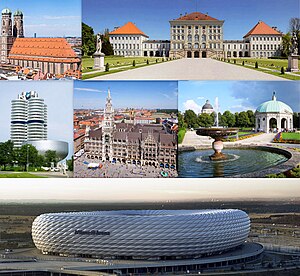Munich (Germany)
|
Munich München |
|||
|---|---|---|---|

From left to right:
The Munich Frauenkirche, the Nymphenburg Palace, the BMW Headquarters, the New Town Hall, the Munich Hofgarten and the Allianz Arena. |
|||
|
|||
| Coordinates: 48°08′N 11°34′E / 48.133°N 11.567°ECoordinates: 48°08′N 11°34′E / 48.133°N 11.567°E | |||
| Country | Germany | ||
| State | Bavaria | ||
| Admin. region | Upper Bavaria | ||
| District | Urban district | ||
| First mentioned | 1158 | ||
| Government | |||
| • Lord Mayor | Dieter Reiter (SPD) | ||
| • Governing parties | SPD / CSU | ||
| Area | |||
| • City | 310.43 km2 (119.86 sq mi) | ||
| Elevation | 520 m (1,710 ft) | ||
| Population (2015-12-31) | |||
| • City | 1,450,381 | ||
| • Density | 4,700/km2 (12,000/sq mi) | ||
| • Urban | 2,606,021 | ||
| Time zone | CET/CEST (UTC+1/+2) | ||
| Postal codes | 80331–81929 | ||
| Dialling codes | 089 | ||
| Vehicle registration | M | ||
| Website | www.muenchen.de | ||
| Largest groups of foreign residents | |
| Nationality | Population (2015) |
|---|---|
|
|
39,204 |
|
|
33,177 |
|
|
27,340 |
|
|
27,117 |
|
|
21,945 |
|
|
21,944 |
|
|
18,058 |
|
|
17,471 |
|
|
13,389 |
|
|
12,267 |
Munich (/ˈmjuːnɪk/; German: München, pronounced [ˈmʏnçn̩],Bavarian: Minga [ˈmɪŋ(ː)ɐ]) is the capital and largest city of the German state of Bavaria, on the banks of River Isar north of the Bavarian Alps. Munich is the third largest city in Germany, after Berlin and Hamburg, and the 12th biggest city of the European Union, with a population of around 1.5 million. The Munich Metropolitan Region is home to 6 million people.
The city is a major centre of art, advanced technologies, finance, publishing, culture, innovation, education, business, and tourism in Germany and Europe and enjoys a very high standard and quality of living, reaching #1 in Germany and #4 worldwide according to the 2015 Mercer survey. According to the Globalization and World Rankings Research Institute Munich is considered an alpha-world city, as of 2015[update].
The name of the city is derived from the Old/Middle High German term Munichen, meaning "by the monks", which in turn is derived from Mönch (which in the end derives from ancient Greek μοναχός). It derives from the monks of the Benedictine order, who ran a monastery at the place that was later to become the Old Town of Munich; hence the monk depicted on the city's coat of arms. Munich was first mentioned in 1158. From 1255 the city was seat of the Bavarian Dukes. Black and gold – the colours of the Holy Roman Empire – have been the city's official colours since the time of Ludwig the Bavarian, when it was an imperial residence. Following a final reunification of the Wittelsbachian Duchy of Bavaria, previously divided and sub-divided for more than 200 years, the town became the country's sole capital in 1506.
...
Wikipedia



